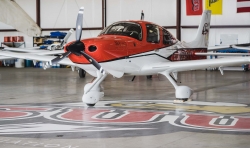
Aviation schools are mandated by law to adhere to the curriculum drafted by the Federal Aviation Administration under the U.S. Department of Transportation. This curriculum cannot be changed or modified by schools by any means, even though requirements for what is taught have not been adequately updated since 1962.
Southern Utah University wants to change all of that.
The SUU Aviation Director of Maintenance, Jared Britt, was recently appointed chairman of the Legislative Committee for the Aviation Technician Education Council (ATEC). In addition to working with current aviation students at SUU, Britt says his goal is to get an exemption from the current curriculum from the U.S. DOT in Washington D.C. that will allow SUU’s Aviation Department to teach their own, updated curriculum to coincide with future airman certification standards and better prepare students for industry jobs.
With this exemption, SUU Aviation says it hopes to graduate better trained technicians that can be job ready upon completion and contends schools teaching the outdated curriculum are sending students into jobs where new graduates must be retrained in proper techniques and current regulations.
Companies like Boeing are left to retrain new graduates on basic tasks required to maintain a modern, sophisticated airplane. Boeing has been frustrated with this process and has stated, “As personnel demand increases over the next two decades, the aviation industry will need to find innovative solutions to keep pace with training requirements.”
Professionals in the aviation industry, government legislators and especially instructors at various aviation schools all agree that the outdated requirements inhibit aviation schools from keeping up with vital changes in aircraft technology.
“Outdated training mandates are more than an impediment; they hinder the aviation maintenance industry’s economic growth,” says Crystal Maguire, executive director of ATEC. “As the global aviation sector expands, economic forecasts predict that U.S. maintenance companies will be unable to meet increased demand because of a significant skilled worker shortage.To meet the need, training organization must produce better prepared aviation mechanics.”
If granted the exception, SUU will be allowed to utilize the method of credit hours in lieu of seat time requirements, will be able to teach with modern, advanced technology and will encourage workforce development so the transition from graduation to career will be smooth and efficient.
In the SUU exemption letter, it states: “Aviation maintenance technician schools with curriculums that emulate industry realities and adequately prepare students for much needed positions will be better equipped to attract students to careers in aircraft maintenance, create job growth, and enhance an industry that already greatly benefits the public.”
SUU hopes to get the exemption granted before the 2018 fall semester so they can implement their new curriculum with the next round of freshmen.